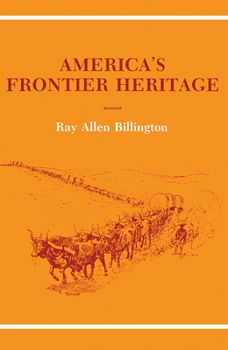America's Frontier Heritage
(Part of the Histories of the American Frontier Series)
Select Format
Select Condition 
Book Overview
The hypothesis advanced in Frederick Jackson Turner's famous 1893 essay, The Significance of the Frontier in American History, has been debated by three generations of scholars. The pioneering experience, Turner suggested, accounted for some of the distinctive characteristics of the American people: during three centuries of expansion their attitudes toward democracy, nationalism and individualism were altered, and they developed distinctively...
Format:Paperback
Language:English
ISBN:0826303102
ISBN13:9780826303103
Release Date:January 1975
Publisher:University of New Mexico Press
Length:320 Pages
Weight:1.20 lbs.
Dimensions:0.9" x 6.1" x 9.2"
Customer Reviews
1 rating
A Defense of the "Frontier Thesis," but only a Partly Successful One
Published by Thriftbooks.com User , 18 years ago
Ray Allen Billington, who died in 1981, was one of the most prolific historians of his generation, and the major defender and reinterpreter of the "Frontier Thesis" of Frederick Jackson Turner. Turner's 1893 "Frontier Thesis" paper is perhaps the most influential essay ever read at the American Historical Association's annual conference. It has exerted a massive influence on the historiography of the United States, in no small measure because of its powerful statement of American exceptionalism and its justification of conquest. Turner took as his cue an observation in the 1890 U.S. census that the American frontier had, for the first time, closed. He noted, "Up to our own day American history has been in a large degree the history of the colonization of the Great West. The existence of an area of free land, its continuous recession, and the advance of American settlement westward explain American development." He insisted that the frontier made Americans American, gave the nation its democratic character, and ensured the virtues of self-reliance, community, and the promise of justice. He noted that cheap or even free land provided a "safety valve" that protected the nation against uprisings of the poverty-stricken and malcontented. The frontier also produced a people with "coarseness and strength...acuteness and inquisitiveness, that practical and inventive turn of mind . . . [full of] restless and nervous energy...that buoyancy and exuberance which comes with freedom." It gave the people of the United States, in essence, virtually every positive quality they have ever possessed. The "Frontier Thesis" has enjoyed both eloquent critics and defenders over the years. None of its defenders, however, has been more zealous than Ray Allan Billington and "America's Frontier Heritage" is his most mature statement on the subject. Turner never really applied his thesis to the test, but Billington invokes the work of historians, sociologists, economists, anthropologists, psychologists, demographers, and a host of other social scientists to "suggest logical means whereby three centuries of expansion did alter the behavioral patterns of the frontiersmen, and to a lessening degree of their descendents in the twentieth century" (p. xiii). Throughout Billington asserts the primacy of the "Frontier Thesis" in shaping American exceptionalism, despite his persistent chirping that he is not a "monocausationlist," not a very convincing statement when one explores this book's persistent pro-Turner bias. A useful example of the manner in which Billington reinterprets the "Frontier Thesis" is his analysis of the labor safety valve. Turner suggested that the frontier provided a draw from the cities so that the burdens of class, economics, and other factors did not weigh on the development of United States the same way that it did in countries were the opportunity of the frontier did not exist. Numerous students have noted that this "safety valve" did not really exist,






